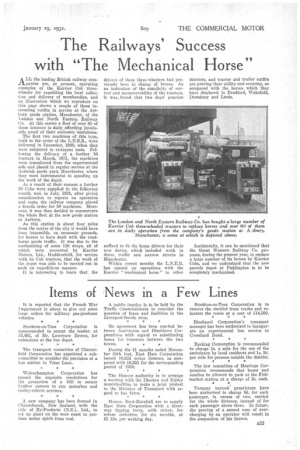The Railways' Success
Page 43

If you've noticed an error in this article please click here to report it so we can fix it.
with "The Mechanical Horse 9 9 A LL the leading British railway com1-1.panies are, at present, operating examples of the Earlier Cob threewheeler for expediting the local collection and delivery of merchandise, and an illustration which we reproduce on this page shows a couple of these interesting outfits in service at the Actbury goods station, Manchester, of the London and North Eastern Railway Co. At this centre a fleet of over 80 of these tractors is daily ,affording invaluable proof of their economic usefulness.
The first two machines of this type, built to the order of the L.N.E.R., were delivered in December, 1930, when they were subjected to stringent tests. Following the delivery of a further 10 tractors in March, 1931, the machines were transferred from the experimental side and placed in regular service at the Ardwick goods yard, Manchester, where they were instrumental in speeding up the work of the depot.
As a result of their success a further 20 Cobs were supplied in the following month, and, in July, 1931, after giving consideration to reports on operation and costs, the railway company placed a fourth order for 50 machines. Moreover, it was then decided to concentrate the whole fleet at the new goods station at Asthury.
As this station is about four miles from the centre of the city it would have been impossible, on economic grounds, for horses to have dealt with the roadborne goods traffic. It was due to the mechanizing of some 120 drays, all of which were converted by Earlier Motors, Ltd., Huddersfield, for service with its Cob tractors, that the work of the depot was able to be carried out in such an expeditious manner.
It is interesting to learn that the drivers of these three-wheelers had previously been in charge of horses. As an indication of the simplicity of control and manceuvrability of the tractors, it was found that two days' practice sufficed to fit the horse drivers for their new duties, which included work in dense traffic and narrow streets in Manchester.
Within recent months the L.N.E.R. has opened up operations with the Karrier " mechanical horse" in other districts, and tractor and trailer outfits are proving their utility and economy, as compared with the horses which they have displaced, in Bradford, Wakefield, Dewsbury and Leeds.
incidentally, it can be mentioned that the Great Western Railway Co. proposes, during the present year, to replace a large number of its horses by Earlier Cobs, and we understand that the new parcels depot at Paddington is to be completely mechanized.




































































































